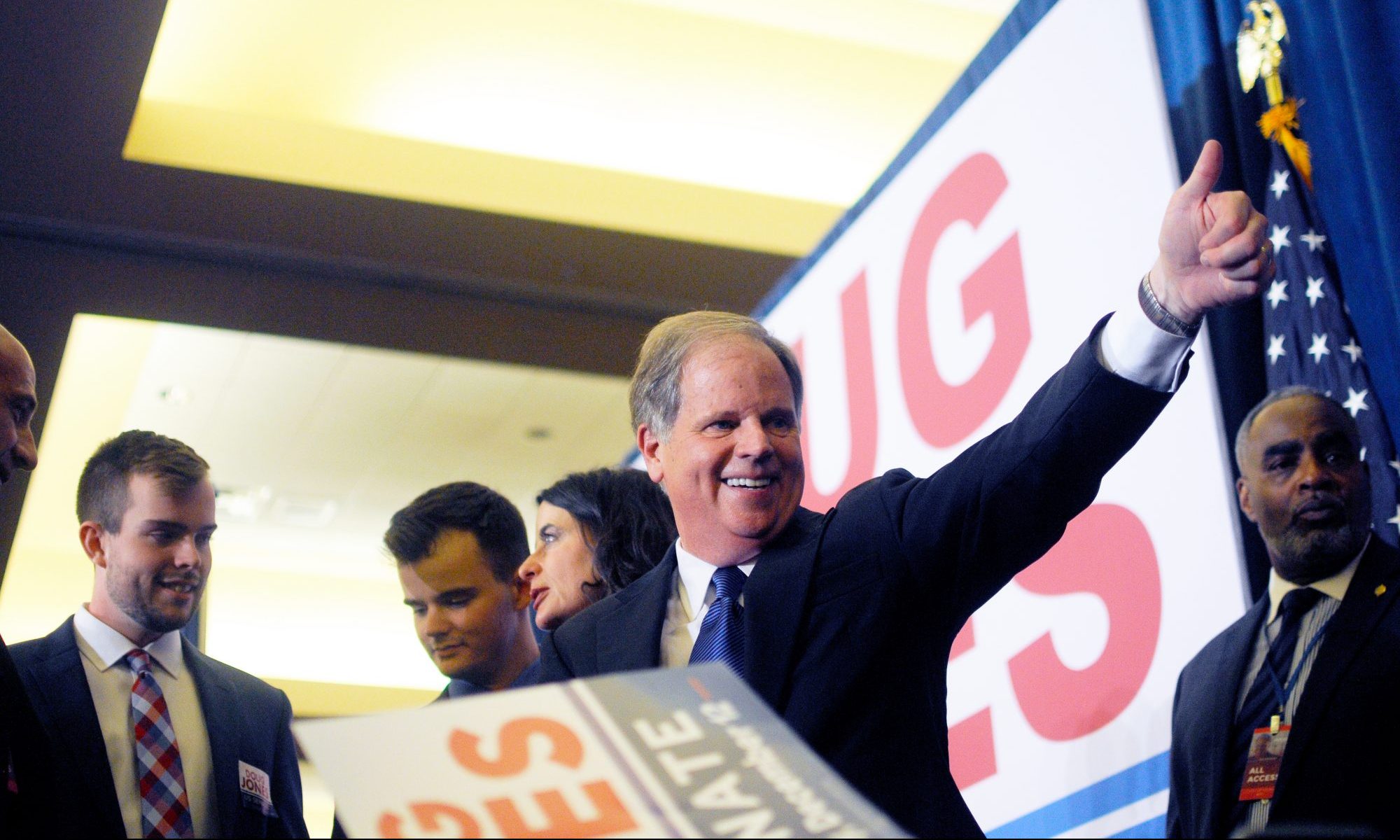Alabama politics did the only thing Alabama politics knows how to do: take the unexpected and make it into a reality, with Democratic candidate Doug Jones pulling off a historic upset. The election places a Democratic senator from the Yellowhammer State in Congress for the first time in a quarter-century.
The newly elected senator and his campaign, built on an unlikely alliance of crossover suburban Republicans, women, black voters and millennials, delivered a shockingly solid defeat to the Republican candidate, former Chief Justice Roy Moore, who just a few months ago was thought to be a shoo-in.
With higher-than-expected turnout, Alabamians’ decision to send Jones to Washington served as a stunning rebuke to Moore, a firebrand conservative judge who has long been a divisive figure in Alabama politics — from his stand for the Ten Commandments in courtrooms and courthouses to his unflinching opposition to same-sex marriage.
While Moore built his campaign on that same rhetoric, a defining characteristic of his decades in public life that built him a national following, Jones provided an antithesis, shaping his campaign around what he called “common decency and common respect.”
“Folks, and you have all heard me say this at one point or another in this campaign, I have always believed that the people of Alabama have more in common than divides us,” Jones said at an electric victory party. “We have shown not just around the state of Alabama but we have shown the country the way that we can be unified.”
Jones’ stunning upset is the first time Alabama has voted for a Democratic senator since 1992 when then-Democratic Sen. Richard Shelby was re-elected to his second term. Just two years later, Shelby would become a Republican as the state continued on a shift toward the red.
A barrage of sexual assault allegations and questions about Moore’s pursuit of young women when he was in his 30s delivered a death blow to his campaign amid a national conversation about sexual misconduct, uniting moderate crossover Republicans with blacks, women and young voters who showed up and showed out for Jones. But Moore, who has a history of underperforming in statewide general elections, having come close to losing an election to the Supreme Court in 2012, was already a vulnerable candidate.
Polls early in the campaign showed a potentially competitive race between Jones, who prosecuted two former Klansmen for the 1963 16th Street Baptist Church Bombing, and Moore, a hero for social conservatives who stood up to federal and state courts alike in his battle against LGBT rights. A judicial panel twice booted Moore from his seat atop the Supreme Court for defying federal court orders, and his second effective removal in September 2016 gave him an opening and a following that prompted him to run for the Senate.
The combination of the allegations and Moore’s treatment by some prominent Republicans and the national GOP offered up a landscape that would prove to be a perfect storm of opportunity for Jones, who had the full backing of a rarely unified Alabama Democratic Party and an energized Democratic electorate.
“This campaign has been about the rule of law,” Jones said. “This campaign has been about common courtesy and decency and making sure everyone in this state, regardless of which ZIP code you live in, is going to get a fair shake in life.”
This race was a tale of two campaigns: one focused and energized, and another that struggled to fill positions and stumbled over a series of missteps that likely cost 70-year-old Moore a seat in the Senate.
While Moore and his staff eschewed traditional campaign practices and struggled to agree on a common path forward, Jones activated a network of liberal organizers and black activists who knocked on more than 300,000 doors and made more than 1.2 million phone calls in the weeks leading up the election. Moore took off almost the entire final week of the campaign while Jones crisscrossed the state to energize voters with prominent Democrats like former Massachusetts Gov. Devall Patrick and New Jersey Sen. Cory Booker.
Moore returned to the trail after nearly a week Monday night in Midland City, when he held a rally with former White House chief strategist Steve Bannon. Bannon painted the race as a referendum on the establishment during his third visit to the state during the campaign. Tuesday night he slid past reporters into his SUV without addressing the result.
Rep. Terri Sewell, who was for years Alabama’s sole Democrat in Washington, also played a hefty role, serving as an advocate and surrogate. Rep. John Lewis, a Civil Rights icon and Alabama native, also lent an air of authority to Jones. Sewell, who spent the final week with Jones, stood by him on stage Tuesday night as confetti fell from the ceiling.
Jones managed to turn out massive numbers of black voters, nearly matching President Barack Obama’s turnout in 2008 and 2012 while creating a coalition that for the first time in years actually allowed black voters to join a statewide majority. Black Belt counties, home to a large portion of the state’s black population, ran up his vote tally, including counties like Dallas County, home to Selma, where Jones won 80 percent of the vote; Montgomery County, where he won 72 percent of the vote; and Birmingham, where he won 68 percent of the vote.
In traditionally Republican-leaning counties like Mobile and Madison, Jones also outperformed Moore. In Madison, which went to Trump in 2016 by 16 percentage points, Jones won by nearly 17 percentage points, and in Mobile, Jones won by 14.
In counties with large college-educated voting populations like Lee County, home to Auburn University, and Tuscaloosa County, home to the University of Alabama, Jones also pulled ahead, winning both by 17 percentage points. Winning those counties was Jones’ only path to victory, and he accomplished it.
Senate Majority Leader Mitch McConnell has said interim Sen. Luther Strange will serve until the end of the session this month, potentially giving Republicans a few more weeks to pass a sweeping tax reform package before Jones is expected to arrive in Washington next month. By the time he is seated by Vice President Mike Pence, his victory will have narrowed the Republican majority by one, giving Democrats more leverage in an already seesaw Senate that has failed thus far to pass any major portion of President Donald Trump’s agenda.
Moore’s defeat in itself offered a blow to Trump even before his agenda could be affected by an emboldened and expanded Democratic caucus.
But a Jones victory could be a sigh of relief for national Republicans who have feared his controversial candidacy, cratered by allegations of sexual assault, would turn into a term in Washington that could have been a predicament for Republicans running in more competitive states.
“This is a brutal reminder that candidate quality matters regardless of where you are running,” said Steven Law, CEO of the Senate Leadership Fund, a PAC aligned with McConnell and Republican Senate leadership. “Not only did Steve Bannon cost us a critical Senate seat in one of the most Republican states in the country, but he also dragged the President of the United States into his fiasco.”
Trump in recent weeks split from most other members of his own party nationally and offered a full-throated endorsement of Moore, tweeting in his support, defending him against the sexual assault allegations and attacking his Democratic opponent. The president, choosing to wade into a divisive election, recorded robocalls for Moore and even held a campaign-style rally in Pensacola, Florida, just miles from the Alabama border and within a major Alabama media market.
But Tuesday night, Trump, who won Alabama with 62.1 percent of the vote in 2016, tweeted subdued congratulations to Jones.
“Congratulations to Doug Jones on a hard-fought victory,” he wrote. “The write-in votes played a very big factor, but a win is a win. The people of Alabama are great, and the Republicans will have another shot at this seat in a very short period of time. It never ends!”
Moore has refused to concede defeat, saying he expects a recount.
“I really want to thank you for coming tonight and realize when the vote is this close that it’s not over,” Moore said at a subdued election night party after the Associated Press and other media outlets called the race. “And we still got to go by the rules about this recount provision.”
An automatic recount will only occur if the spread between Moore and Jones is less than 0.5 percentage points. With only military and provisional votes outstanding, Jones leads Moore by 1.5 percentage points. Secretary of State John Merrill said Tuesday that those votes are unlikely to alter the results.
“That’s what we’ve got to do is wait on God and let this process play out,” Moore said. “I know it’s late. We can’t wait and have everybody wait until after 11:00. But the votes are still coming in and we’re looking at that.”
Once the votes are officially certified later this month, Moore could request a recount, but to do so, he will have to fork over a check. Alabama law requires a candidate requesting a recount to pay for the cost.





















































